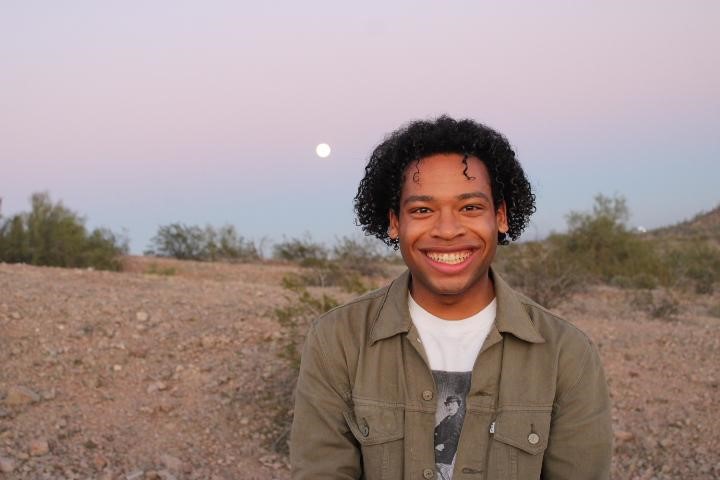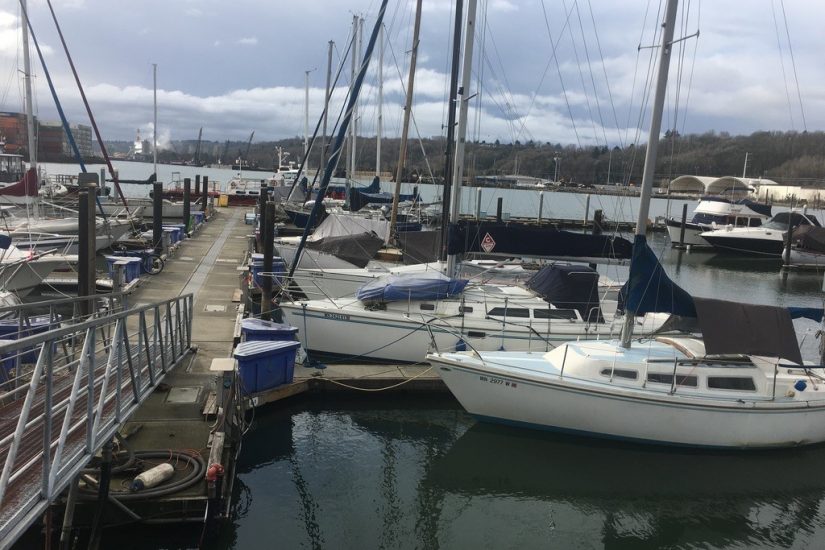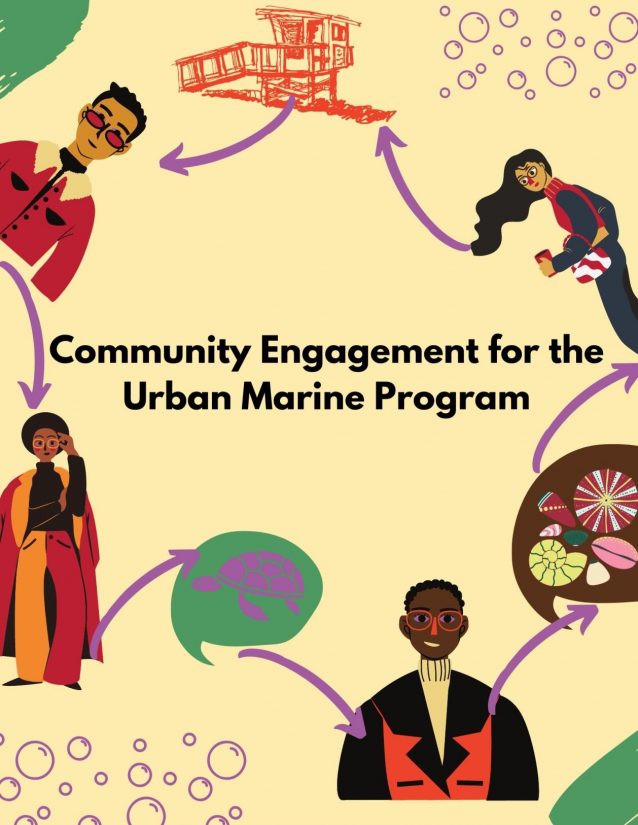William Walker on Reciprocity and the Intersectionality of Water
William is from Arizona and is a junior at Arizona State University, where he’s studying sustainability, urban planning, and French. I connected with William through Washington Sea Grant, where both he and I have worked.
William is a Doris Duke Conservation Scholar, and his participation in the Doris Duke program is what led him to Sea Grant. It was after learning that he was studying the needs of urban populations and their use of the marine environment that I became interested in talking to him. William spoke to me about the work he did at Sea Grant, the importance of working in the marine and environmental fields with intersectional and reciprocal approaches, and what he hopes to do after graduating. William’s words have been edited for length and clarity, and they are presented here as a continuous story.

The Doris Duke Conservation Scholars Program looks at biocultural conservation from the lenses of diverse stakeholders. It looks at diversity, equity, and inclusion frameworks and really asks how we can include BIPOC (Black, Indigenous, and People of Color) communities in the conservation field. It’s a two-year summer program similar to a fellowship, and my first year involved learning from the many diverse faces in this field and traveling around the state of Washington really orienting to place.
During the second summer, I took what I learned from the previous year and applied it to my work on Washington Sea Grant’s Urban Marine Program. The UMP seeks to engage communities with which Sea Grant has not historically worked or collaborated. There’s a lot of identity that’s tied to water, especially for many BIPOC communities in Washington, so the program is about connecting with that and addressing disparities in accessibility. It’s big on accessibility, and that doesn’t just mean doing events or programming with these communities. It’s also about asking, “What are the disparities affecting these communities? How do we help solve their unique and complex challenges?”
The UMP is also big on meaningful, sustainable collaboration with communities, as opposed to working with them for a short period of time and then just leaving. Melissa Watkinson taught me the term “helicopter research,” where environmentalists go into communities and just exploit and extract. They take, learn, and then leave without building strong relationships. I had already been thinking about my own privilege and agency, as I knew I was benefiting because I was in the Doris Duke program. I was being compensated for it and getting class credits that fulfill university requirements. I was benefiting in all types of ways beyond just adding to my resume, so learning that term was so meaningful to me. I knew that I could only do so much within one summer, but how could I practice reciprocity and ensure that the UMP provided a framework that was relevant to the moment but could always be built upon?
I asked Sea Grant if I could create a report or a toolkit for them. I wanted to create a guide on how to do community engagement and on what Sea Grant should be thinking about based on the research we did this summer as well as my own knowledge systems that I acquired from previous work in the field. They told me that was a great idea, so I did it: The toolkit provides a framework on how the UMP should view and approach community engagement and the different trends and themes we might expect to see. I incorporated the United Nations’ Sustainable Development Goals (SDGs) and made them a bit of a focal point in the toolkit.
Research should be more than just getting your paper completed and thinking you’re done. You can do so much more and leave behind something meaningful, like my idea of a toolkit that provides frameworks, or strong partnerships and relationships that continue after you leave because you’ve established and fostered those connections. These are things we should be working on in academia because we all take part in this often-oppressive practice where we build these small, short relationships for a couple of years and just leave when there is so much more we could be doing.

I also had the opportunity to host a workshop with people from Sea Grant and the Doris Duke program as part of the UMP. We had a lot of dialogue related to the UN SDGs. We talked about the intersectionality of water. We talked about accessibility, how people connect with water and how that’s different for each person, how it holds memory and holds life.
For instance, I identify with water here in the middle of this dry, Arizona desert because I get water from the Colorado River. It makes me think about water conservation and my practices: how I keep myself hydrated, and how I’m using it to support my community. I also try to practice reciprocity with water because I realize that it’s something that I’m taking from the environment. If you’re getting water from the Colorado, it’s been stolen from Indigenous land. So how do I recognize and reconcile with that and give back?
The intersectionality of water means a lot to me. It means unpacking what water means for people and looking at accessibility in terms of identity. It means working with communities and seeing what they need, and how you can best work as a collaborator–and if that’s not possible, finding them another partner who best suits them. Intersectionality also means focusing on more than just one thing: For example, if I was to think about a salmon population, I’d also be thinking about what the salmon eat, and the people who rely on that salmon. I’d be thinking about the salmon’s history and whether it’s overfishing or colonial factors that have shaped how their present ecosystem functions. Unpacking all that, having that historical lens, having a community lens–that’s how I define what intersectionality has brought to the marine and environmental fields. Sadly, some folks have very narrow perspectives when it comes to water and related issues, which is why we were developing the UMP.
Like intersectionality, environmental justice looks at issues from a systems-thinking, holistic perspective, and when you do that, you return power and agency to communities that have been stripped of both. The ways that fields like sustainability and conservation operate can actually disconnect humans from the environment, and they’re rooted in colonial structures of oppression and even death. Meanwhile, there are so many BIPOC communities that have pioneered and invented different conservation and sustainability practices. They’re just not getting credit for it because their practices aren’t rooted in academia.
That’s why when you highlight environmental justice frameworks, you move away from focusing on the negative and saying, “There are so many problems!” You instead begin realizing that there are so many community-oriented solutions to the challenges we’re facing. Yes, there are horrible things happening with our climate, but when we include justice and equity and put these communities at the center of our work, we’ll be able to break these generational curses that have ruined the environment. These frameworks are especially crucial right now because we’re finally at a moment where people are trying to reconcile with this country’s past.

In order to maintain the pressure for justice that the Black Lives Matter movement has renewed, we need to take advantage of the current moment and keep at it. We need to realize that changes are happening because so many people are talking about the need for it. At the same time, you have to give credit to our leaders and activists and people in our community who’ve been talking about these issues since day one. So put them at forefront and don’t let them stop talking! Let them continue this conversation, and use the resources, power, privilege, and agency that you have to really propel those discussions.
To me the most effective avenues for change come from providing equity and inclusion, as well as spaces for storytelling, ensuring that everyone feels welcome and heard and has a place at the table. We need to highlight people and their different narratives and let them be raw, unbothered, messy, and uncompromised without any type of judgment. What I see myself doing is trying to incorporate these conversations in my classes, with my own friend groups, and with my own communities. Taking advantage of the power and individual platforms that you have in order to talk to people, to build stories, and to center justice and equity in your field will create change.
You’re going to have to be willing to sacrifice something to create change, particularly when it comes to the privilege you have. We’re seeing all these small changes happening right now in response to the BLM movement, and they’re all needed, but a lot of these changes are coming about because people are putting their lives on the line, organizing, getting out into the streets, and not really even thinking about how they might be perceived or what’s going to happen next. And instead of fighting for a series of smaller, incremental changes, like going from a civil rights act, to a voting rights act, and so on, we have to put equity at the table and have big demands. They’re not even big demands because we deserve what we are calling for, and we shouldn’t accept anything less for an answer. Don’t take no for an answer and hold people accountable. And stop playing in the world of respectability politics and just use your platforms to go for it.
Between now and my graduation in 2022, I’ll be looking into graduate programs and fellowships. I want to go somewhere I can hear new perspectives. I want to study something sustainability- or environment-oriented, but from the lens of being a leader, where I take my scientific knowledge and other knowledges and apply them to foundation-based work. I want to start a sustainability foundation that does projects and initiatives with communities around the world, but in a way that gives them agency to act on their own. I want to be able to give community action grants to people. That’s my plan, to propel myself toward that goal.
I always used to think that I might create some change and maybe things would be better somewhere down the line, but now I’m starting to think that I will see real transformation come in my lifetime. With COVID-19 happening on top of everything else, it’s almost like there’s not much else to lose at this point, as sad as that is. The way the system is playing out is only encouraging us to go out and make change so that we can make the world better. And I’d say that the pandemic is also creating a space for empathy and that a lot of people are starting to think about and be there for each other in new ways. I really think we have the opportunity to create a new world where people truly care about each other, and there are a lot of different community-oriented solutions and stories that we can look to as we move forward.